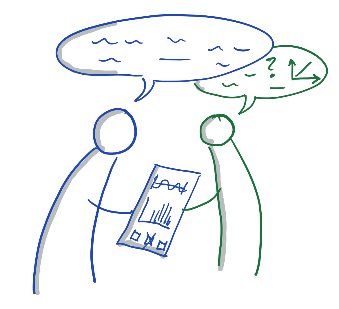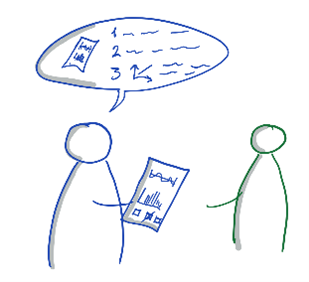The reflective investigation is peer mentoring using a combination of two practices:
The reflective conversation, which is a staged conversation designed to encourage reflection and dialogue.
The scientific investigation, which involves a systematic examination of data.
In essence, the reflective investigation is a reflective conversation about specific data with the purpose of exploring and gaining a deeper understanding of one's teaching practices (Christensen, 2023; Felten, 2013).
The purpose of the reflective investigation is for a colleague to help another colleague reach a better understanding of a particular situation, leading to new and improved actions as a teacher. Additionally, the reflective investigation can increase the colleague’s awareness of the fundamental pedagogical values and principles that guide their pedagogical decisions, and what they consider meaningful teaching and education (Felten, 2013).
Examples of data materials are:
Two colleagues allocate approximately 30 minutes in their calendars to meet. It is the responsibility of the colleague who initiates the reflective investigation to share specific data or materials with the invited colleague before the meeting. The reflective investigation consists of three phases:
This arrangement requires participants to utilize the time and conduct a thorough examination of the pedagogical issue and investigation data material.

Prior to the meeting, you will have collected data and produced material about your teaching.
You invite a colleague to a 30-minute meeting about a case, dilemma, situation, or idea that you want to investigate further.

You describe the case and show your colleague your data.
Your colleague will engage in your investigation from a professional standpoint with focus on pedagogical aspects.

You round off the meeting and tell your colleague how the meeting has helped you.
You and your colleague can arrange to meet again when you have made progress with the aspects that the conversation has brought about.
Introduction and framing (approximately 5 minutes)
Colleague with data material:
“Thank you for agreeing to meet with me and discuss teaching. We have half an hour and I would like us to reflect jointly on a specific situation/a particular issue/a current dilemma that is currently on my mind. To give a brief overview, it involves…”
Investigation (approximately 20 minutes)
Colleague with data material:
During the investigation, the invited colleague can apply questioning techniques and attentive listening, e.g.:
Concluding remarks (approximately 5 minutes)
Colleague with data material: